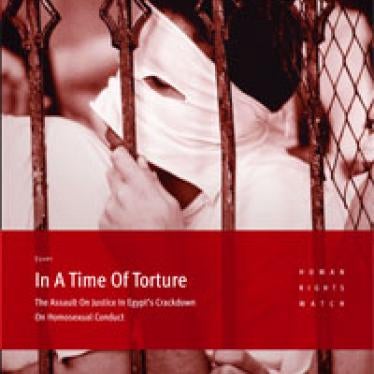S.E. Monsieur Amadou ALI
Minister of Justice
Cameroon
Honorable Minister:
We are writing to urge the immediate protection from abuse and release from jail of eleven men who have been detained apparently on suspicion of consensual homosexual activity. These men have already experienced the abuse of fundamental human rights and now face the prospect of additional and compounded violations. On 21 May 2005, police arrested 11 men from the Nlongka Brigade in Yaounde. (Their names are attached at the bottom of this letter.) The men, all between the ages of seventeen and thirty-five, were socializing in the Elise Bar when the nightclub was raided. Though they have not yet been charged, it appears that they were arrested on suspicion of sodomy in violation of Section 347 of the Cameroonian Penal Code. The eleven are being held at Kondegui Central Prison in Yaounde.
These men have been held for seven months so far without trial or criminal charge in violation of the International Covenant on Civil and Political Rights Article 14. To the extent that their detention is justified on the basis of suspicion of private sexual relations, their right to privacy has also been violated. The very existence of laws criminalizing consensual, private homosexual conduct has been held by the United Nations Human Rights Committee, in the 1994 case of Toonen v Australia, to violate protections for privacy and non-discrimination in the ICCPR. Cameroon’s accession to the ICCPR in 1984 means it is bound by the standard set by Toonen.
Moreover, these men now face a further invasion of their physical privacy in the form of forced anal examinations. In our discussions with colleagues in Cameroon, we have learned that the Prosecutor’s Office has ordered the men to undergo a medical examination, in the belief that such a test would prove definitively whether the men have engaged in homosexual conduct. This treatment, in its intrusiveness and invasiveness, amounts to cruel and inhuman treatment—a violation not only of the ICCPR but of the UN Convention Against Torture, to which Cameroon acceded in 1987.
We entreat you, as a matter of urgency, to intervene to prevent these examinations. These examinations have no investigative value, are abusive, intrusive, and when conducted non-consensually and under incarcerated conditions, amount to cruel and inhuman treatment; as such, they constitute a serious violation of the human rights of the detainees. In countries where they have been administered, these examinations have caused grave physical and psychological suffering to their victims.
While we understand that there are important internal debates about homosexuality in Cameroonian society, these men have not been charged with any crime and there is no evidence that they have broken any law. We ask that you use your offices to ensure that these men are not subjected to invasive medical examinations and to arrange for their unconditional release.
Physical examinations of the anal regions of men accused of homosexuality rely on the false idea that anal sex leaves lasting lesions or tears around the anus. In a communication to Human Rights Watch, Dr. Lorna Martin, Chief Specialist/Head of Division Forensic Medicine & Toxicology, University of Cape Town affirms that “it is impossible to detect chronic anal penetration; the only time the [forensic anal] examination could be of any use is for acute non-consensual anal penetration, when certain injuries may be seen.” In addition, in a communication with the IGLHRC, Dr. Vincent Iacopino, Senior Medical Advisor for Physicians for Human Rights and one of the principal drafters of UN Manual on the Effective Investigation and Documentation of Torture and Other Cruel, Inhuman or Degrading Treatment or Punishment (Istanbul Protocol) agrees that “forensic anal examinations have no value, whatsoever, in identifying consensual anal intercourse.”
The participation of medical personnel in these examinations is also a violation of medical ethics. The 1975 Tokyo Declaration of the World Medical Association prohibits physicians from being in any way involved in the practice of torture or other forms of cruel, inhuman or degrading treatment. According to the Principles of Medical Ethics Adopted by General Assembly resolution 37/194 of 18 December1982, no health personnel may “engage, actively or passively, in acts which constitute participation in, complicity in, incitement to or attempts to commit torture or other cruel, inhuman or degrading treatment or punishment.” In addition to not taking part in such acts, the sole relationship health personnel may have with detainees is to “evaluate, protect or improve their physical and mental health.”
Honorable Minister, these men were doing nothing more than exercising their right to peacefully associate and assemble with others. We ask that you assist in gaining their release so that they may rejoin their families and continue on with their lives. We hope to hear from you soon regarding this communication.
Yours sincerely,
Jessica Stern
Human Rights Watch
New York, New York
Paula Ettelbrick
Executive Director
International Gay and Lesbian Human Rights Commission
New York, New York
Tom Dougherty
Executive Director
Doctors of the World
New York, New York
Chino Obiagwu
Legal Defence and Assistance Project LEDAP
Lagos, Nigeria
Gay McDougall
Executive Director
GlobalRights
Washington, D.C.
Thuli Made
Behind the Mask
Johannesburg, South Africa
Leonard S. Rubenstein
Executive Director
Physicians for Human Rights
Boston, Massachusetts
Frans Viljoen
Centre for Human Rights, University of Pretoria
Cc:
Honorable Minister of Health
National Commission on Human Rights and Freedoms
Cameroon National Medical Association
Cameroon Ambassador to the United States
Cameroon Ambassador to Nigeria
Cameroon Ambassador to South Africa
U.S. Ambassador to Cameroon
Nigerian Ambassador to Cameroon
South African Ambassador to Cameroon
Names of Detainees
LAMBA Marc Lambert
NOUBAGA Stephane
NDEBE Didier
ATANGANA Pascal
MOMGOCHE Alim
TSIMI Mbassi Raymond
AYISSI Francois
ANGOULA Christian
BALA Adamou
TCHATCHOUA Blaise
ZANGA Eric Emerant







